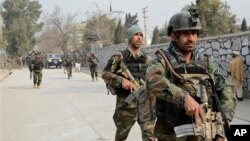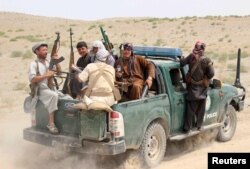Afghanistan’s ministry of defense has announced the creation of a new militia force comprising about 36,000 men to defend areas that military-led operations have cleared of Taliban insurgents.
The move comes despite long-running accusations of rights abuses against the existing Afghan Local Police, which consists of local militias trained and paid by the U.S. military.
Defense Ministry spokesman, Dawlat Waziri, said in a brief statement the new force will consist of 7,500 officers of the Afghan National Army, or ANA, and 28,500 other personnel. The recruitments will be made from Afghan government-controlled areas where they ultimately will be deployed after undergoing military training to keep insurgents from staging a comeback.
He emphasized that the new Afghan militia force being raised will work under the direct command and control of the defense ministry. Waziri did not say when the recruiting process will begin.
Patricia Gossman, senior Afghanistan researcher at Human Rights Watch, has swiftly criticized the announcement, saying accountability of forces operating outside the normal ANA structure has been a persistent problem.
“What remains unclear is whether these recruits would come from existing militia forces, and if so, how the [Afghan] ministry would ensure that they would be held accountable,” noted Gossman told VOA.
The New York-based watchdog has been closely monitoring and documenting past allegations of rights violations against Afghan militias.
‘Oversight mechanisms’ go unexplained
Gossman notes that Afghan authorities have not explained what kind of “oversight mechanisms” will be put in place to hold members of the new militia force responsible in instances of abuses against civilian population. Allegations against ALP members included sexual abuse of boys.
“What lessons has the Defense Ministry learned from the problems with the ALP? No one has really answered these questions,” she added.
Afghan officials maintain, however, that by placing the new militia force under the army’s control will help prevent the abuse and misuse of authority.
Thursday’s announcement comes amid fierce clashes between Afghan security forces and Taliban insurgents across the country, with both sides claiming to have inflicted heavy casualties on their opponents.
The Taliban controls or contests about 44 percent of the Afghan territory and insurgents continue to stage deadly attacks against government forces.
Under U.S. President Donald Trump’s new Afghan war strategy, American forces have stepped up airstrikes against insurgent targets, hoping the battlefield pressure will push the Taliban to the negotiating table for talks with the Afghan government to end the conflict.
The insurgent group has vowed to resist the pressure, though, and to intensify battlefield attacks in the coming spring fighting. The Afghan conflict killed and wounded more than 10,000 civilians while pro-government forces reportedly lost about 10,000 personnel in 2017.





